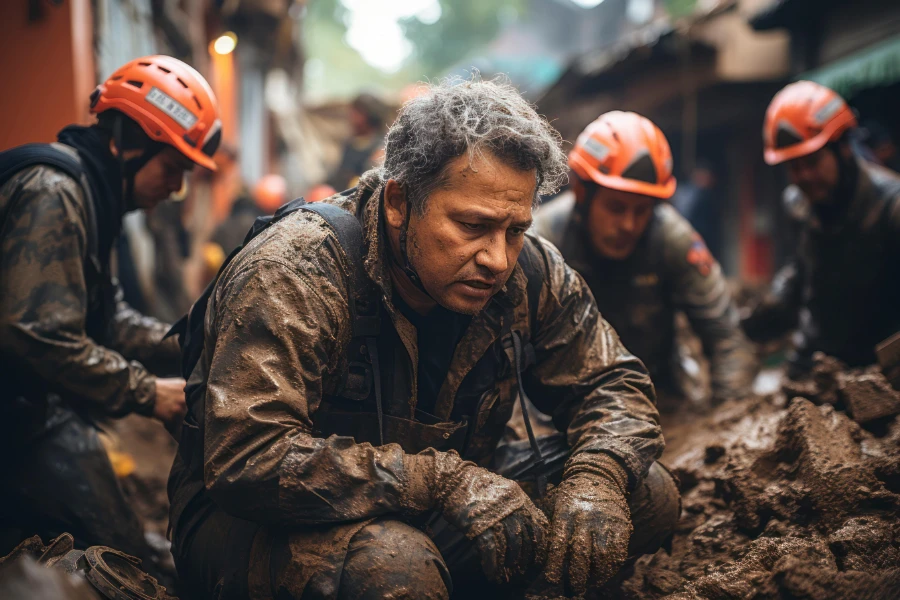Firefighting, a profession marked by bravery and resilience, also brings unique mental health challenges. Firefighters routinely face life-threatening situations, witnessing events that can leave lasting psychological impacts. This article delves into these challenges, underscoring the critical need for comprehensive psychological support. It highlights the various support systems, including counseling, stress management, and peer networks, essential for maintaining the mental well-being of these heroes.
Section 1: Mental Health Challenges Faced by Firefighters
Identifying Common Mental Health Issues
Firefighters are often exposed to traumatic events, from life-threatening fires to medical emergencies. This exposure can lead to a range of mental health issues, including Post-Traumatic Stress Disorder (PTSD), depression, and anxiety. PTSD, in particular, is common due to the nature of their work, characterized by intrusive memories, heightened alertness, and emotional numbness. Depression and anxiety can stem from the cumulative stress and the high-pressure environment. Recognizing these conditions is crucial for early intervention and effective support.
Impact of Job-Related Stress
The high-stress nature of firefighting significantly impacts mental health. Firefighters must make split-second decisions in life-threatening situations, often working in hazardous conditions. This constant exposure to danger and the responsibility for the safety of others can lead to chronic stress. Real-life examples, such as firefighters experiencing burnout or struggling with decision-making fatigue, illustrate the extent of this impact. Addressing job-related stress is vital for the long-term mental health of firefighters.
“In fire, you can plan everything out to the minute, and a minute before that, everything changes.” – Dan Felix. This quote encapsulates the unpredictable nature of firefighting and the mental agility and resilience required by firefighters in their line of duty.
Section 2: Peer Support Programs in Fire Departments
The Role and Structure of Peer Support
Peer support programs in fire departments offer a unique form of mental health assistance. These programs provide support from colleagues who understand the job’s challenges firsthand. Structured as a network of trained individuals within the department, peer support programs offer a safe space for firefighters to discuss their experiences and feelings. The shared understanding and camaraderie within these programs make them an effective tool for addressing mental health issues.
Effectiveness and Success Stories
The effectiveness of peer support programs is evident in various case studies. For instance, a fire department in New York implemented a peer support program that led to noticeable reductions in stress levels among its crew. Firefighters reported feeling more understood and supported, leading to improved mental well-being and job satisfaction. Such success stories underscore the value of peer support in creating a supportive work environment.
Section 3: The Role of Family Support
Family’s Impact on Firefighter’s Mental Health
The support of family is a critical component in a firefighter’s mental health. Families provide emotional stability and a sense of normalcy, which can be grounding for firefighters dealing with job-related stress. However, the nature of firefighting can also place a strain on family relationships. Families often worry about the safety of their loved ones, and the irregular work hours can disrupt family life. Providing support to families, therefore, is as important as supporting the firefighters themselves.
Resources and Support for Families
Recognizing the challenges faced by firefighters’ families, various resources and support systems are available. These include family counseling services, support groups, and educational programs about the challenges of firefighting. These resources aim to help families understand the nature of the work, cope with the associated stresses, and effectively support their firefighter family members.
Section 4: Tailored Counseling Services for Firefighters
Specialized Counseling Needs
Counseling services for firefighters are tailored to meet their specific mental health challenges. These services take into account the unique aspects of firefighting, such as exposure to traumatic events and the need for resilience in high-pressure situations. Counselors specializing in this field offer targeted therapies and support, addressing issues like PTSD, anxiety, and the cumulative effects of job-related stress.
Access and Utilization
While these specialized counseling services are invaluable, accessing them can sometimes be challenging for firefighters. Stigma around mental health, busy schedules, and concerns about confidentiality can hinder utilization. Fire departments are actively working to overcome these barriers, ensuring that firefighters have easy and confidential access to counseling services. Efforts include increasing awareness, simplifying the process of seeking help, and ensuring confidentiality.
Interesting Facts About Psychological Support for Firefighters
- Firefighter Suicide Rates: Firefighters face a higher risk of suicide compared to the general population. The constant exposure to traumatic events, coupled with the high-stress nature of their job, significantly impacts their mental health. Studies have shown that firefighters are more likely to die by suicide than in the line of duty. This alarming statistic highlights the critical need for effective mental health support and suicide prevention strategies within fire departments.
- Impact of Sleep Deprivation: Firefighters often work long shifts, leading to chronic sleep deprivation. This lack of sleep not only affects their physical health but also has severe implications for their mental well-being. Sleep deprivation can exacerbate symptoms of depression, anxiety, and PTSD. It impairs cognitive functions, decision-making abilities, and emotional regulation, making it essential for fire departments to address sleep issues as part of their overall mental health support strategy.
- Stigma Around Mental Health in Firefighting: Despite the growing awareness of mental health issues, there is still a significant stigma associated with seeking psychological help in the firefighting community. Many firefighters fear being perceived as weak or unfit for duty if they express their mental health struggles. This stigma can prevent them from seeking the help they need, making it crucial for fire departments to create a culture where mental health is openly discussed and prioritized.
Section 5: Preventative Measures for Mental Health
Proactive Strategies and Programs
Proactive mental health strategies are increasingly being implemented in fire departments. These strategies aim to prevent mental health issues before they arise. Programs include regular mental health screenings, resilience training, and workshops on stress management. By equipping firefighters with the tools to manage stress and build resilience, these programs aim to mitigate the long-term psychological impacts of firefighting.
Building Resilience
Building mental resilience is a key focus of these preventative programs. Techniques such as mindfulness training, cognitive-behavioral strategies, and relaxation exercises are taught to firefighters. These skills help them manage the mental demands of their job, cope with stress in healthier ways, and maintain their overall mental well-being.
Section 6: Stress Management in Firefighter Training
Integration of Stress Management Techniques
Stress management techniques are now an integral part of firefighter training programs. These techniques, including breathing exercises, mindfulness, and team debriefings, are designed to help firefighters manage the immediate and long-term effects of job-related stress. Training also focuses on recognizing signs of stress in oneself and colleagues, fostering a supportive environment.
Ongoing Support and Resources
Firefighters have access to ongoing support and resources for stress management. These include workshops, counseling sessions, online tools, and wellness programs. Fire departments encourage their personnel to regularly use these resources, fostering a culture of mental health awareness and support.
Conclusion
Supporting the mental health of firefighters is not just a necessity; it’s an obligation. Ensuring their mental well-being is as important as their physical safety. This article highlights the various challenges and support systems in place, emphasizing the need for continued focus and development in this area.
Frequently Asked Questions
In this section, we address some additional questions about the psychological support for firefighters. These questions provide deeper insights into areas not covered in the main article, enhancing understanding of the mental health support available for these brave individuals.
How Do Firefighters’ Mental Health Needs Differ from Other First Responders?
Firefighters face unique challenges due to the nature of their job. Unlike other first responders, they regularly enter dangerous, unpredictable situations, often involving fire and rescue in hazardous environments. This exposure to extreme conditions can lead to specific mental health issues like acute stress disorder or heightened anxiety levels. Additionally, the camaraderie and close-knit nature of fire teams mean that incidents affecting one member can impact the entire group, necessitating a tailored approach to their mental health care.
What Are the Long-Term Effects of PTSD on Firefighters?
Long-term effects of PTSD in firefighters can include chronic anxiety, depression, and even physical health issues like hypertension and heart disease. PTSD can lead to difficulties in personal relationships, social withdrawal, and a decreased ability to function effectively at work. In severe cases, it can result in substance abuse as a coping mechanism. Early intervention and ongoing support are crucial in mitigating these long-term effects and helping firefighters maintain their mental and physical health.
How Can Fire Departments Foster a Culture of Mental Health Awareness?
Fire departments can foster a culture of mental health awareness by normalizing conversations about mental health and providing regular training on recognizing and managing stress and trauma. Leadership plays a crucial role in this by openly discussing mental health, showing support for mental health initiatives, and ensuring confidentiality for those seeking help. Departments can also implement peer support programs and encourage participation in mental health workshops and debriefings after traumatic incidents.
Are There Specific Mental Health Programs for Retired Firefighters?
Yes, there are specific mental health programs tailored for retired firefighters. These programs recognize that retirement can bring its own set of challenges, including loss of identity and purpose, adjustment to a different lifestyle, and ongoing effects of past trauma. These programs often include counseling, support groups, and resources focused on helping retired firefighters transition to civilian life while managing any lingering mental health issues from their service years. They provide a vital support network, helping retired firefighters navigate this new phase of their lives.
References
For further information and in-depth understanding, readers are encouraged to refer to a range of expert sources. These resources provide comprehensive insights into the mental health needs of firefighters and the support systems available. They offer guidance and best practices for maintaining the mental well-being of these brave individuals.
- 78 Firefighter Quotes to Appreciate our Hometown Heroes – Everyday Power
- Firefighter Motivational Quotes – Fire Dept. Family
- Psychological support for firefighters – American Psychological Association
- Firefighter Quotes Motivation – Pinterest

Jeromy VanderMeulen is a seasoned fire service leader with over two decades of experience in emergency response, training, and public safety management. He currently serves as Battalion Chief at the Lehigh Acres Fire Control & Rescue District and is CEO of the Ricky Rescue Training Academy, a premier provider of online and blended EMT and firefighter certification programs in Florida.
Jeromy holds multiple degrees from Edison State College and the Community College of the Air Force, and is pursuing his MBA at Barry University. He maintains top-tier certifications, including Fire Officer IV, Fire Instructor III, and Fire Inspector II, and has served as a subject matter expert for a court case. He is a member or the Florida Fire Chiefs Association.
Jeromy also contributes to state-level fire safety regulation and serves on several hiring and promotional boards.

